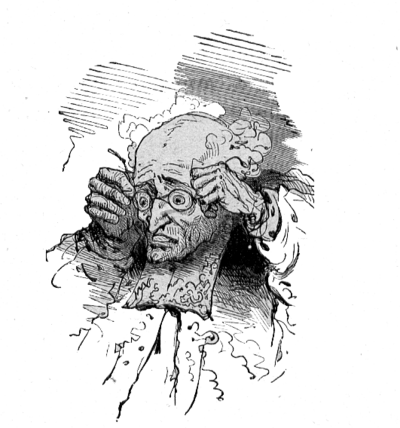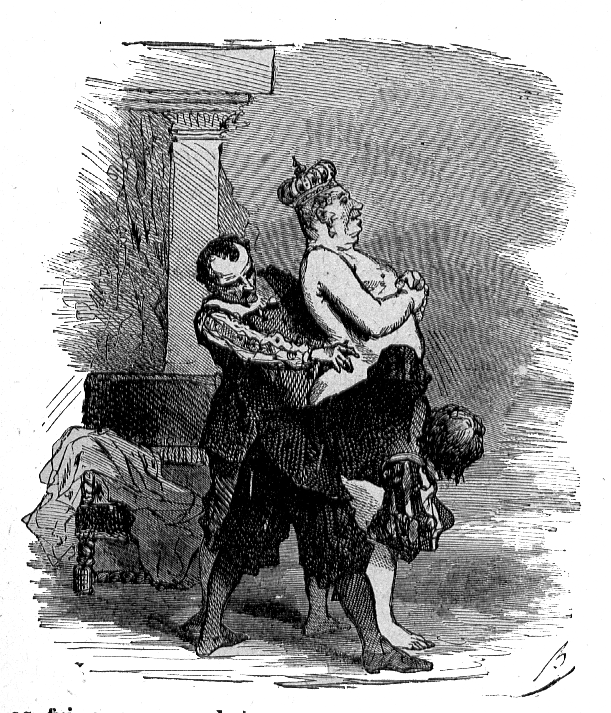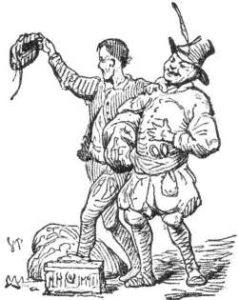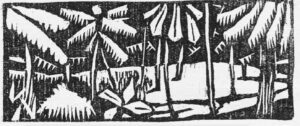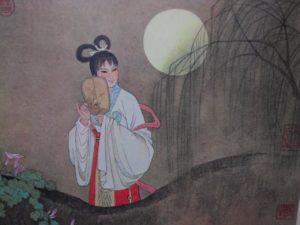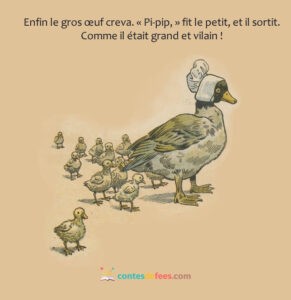
Les habits neufs de l’empereur
LIRE
The emperor’s new clothes
A long time ago, there lived an emperor who loved new clothes more than anything else, so much so that he spent his entire fortune on his wardrobe. He didn’t care about military parades, nor about the theater, nor about his walks in the woods, unless it allowed him to show off his new clothes. He had a suit for every hour of every day of the week, and while a king is usually said to be in council, it was always said of him, “The emperor is in his wardrobe!”
In the great city where he lived, life was cheerful and every day many strangers arrived. One day, two crooks arrived who claimed to be weavers and to be able to weave the most beautiful cloth imaginable. Not only would the colors and pattern be exceptionally beautiful, but the clothes made from it would have the amazing property of being invisible to idiots and incompetents.
“What wonderful clothes those must be,” the emperor thought. “If I had such clothes, I could find out which of my subjects is not fit for office and decide between the clever and the foolish! I must have this cloth woven for me at once!” He gave the two swindlers an advance on their work and they set to work.
They set up two looms, but they pretended to work because there was absolutely no thread on the loom. They asked for the finest silk and the most precious gold, which they took for themselves and stayed on their empty looms until well into the night.
“I would like to know where they are with the fabric,” said the emperor to himself. But he felt uncomfortable with the idea that she was invisible to those who were foolish or wrong in their jobs. He told himself that he had nothing to fear for himself, but preferred to send someone else to see how it went. As word spread, everyone in the city knew about the exceptional qualities of the fabric and was eager to find out if their neighbor was inept or stupid.
“I will send my old and honest minister to the weavers,” said the emperor. “He is the best judge of the look of the cloth; he is of great intelligence and no one does his work better than he!”
So the good old minister went into the workshop where the two crooks were sitting, working on their empty looms. God forbid,” thought the minister, his eyes widening. “I don’t see anything! But he was careful not to say so.
The two crooks invited him to come closer and asked him if this was indeed a nice pattern and beautiful colors. Then they showed him an empty loom. The poor old minister’s eyes widened even more, but he still saw nothing, since there was nothing there. My God,” he thought, “am I a fool? I would never have believed it and no one must know! Would I be incompetent? No, I mustn’t say I can’t see the fabric.
“Well, what do you say?” asked one of the weavers.
“Oh, it’s lovely, everything lovely!” replied the old minister, looking through his glasses. “Those patterns and colors! I shall not fail to tell the emperor that I like it all very much!”
“We are delighted!” said the two weavers. Then they described the colors and discussed the pattern. The old minister listened attentively so that he himself could talk about it when he returned to the emperor; and so he did.
The two swindlers demanded more money, more silk and more gold for their weaving. They put everything in their pockets and nothing on the looms; but they continued, as they had done until now, to pretend to work.
The emperor soon sent another trusted official to see how the work was going and when the cloth would soon be ready. It happened to this man what had happened to the minister: he looked and looked again, but as there was nothing on the loom, he could not see anything.
“Is this not a beautiful piece of cloth?” the two crooks asked him, showing and explaining the beautiful patterns that simply did not exist.
I’m not a fool,” said the official, “is it because I’m not suitable for my job? That would be rather strange, but I mustn’t let it show!
“And he praised the fabric, which he had not seen, and then expressed his joy at the colors and the wonderful pattern. “Yes, it is quite wonderful,” he said to the emperor.
Everyone in the city was talking about the beautiful fabric, and the emperor wanted to see it with his own eyes while it was still on the loom. Accompanied by a whole crowd of dignitaries, including the minister and the official, he went to the two swindlers, who were busy weaving without a single thread.
“Isn’t it beautiful?” said the two officials who had already come. “May your Majesty admire the patterns and colors!” Then they pointed to an empty loom, imagining that the others could see something in it.
How,” thought the Emperor, “but I see nothing! It’s terrible! Am I a fool? Wouldn’t I be made to be emperor? That would be the most terrible thing that could ever happen to me.”
“Beautiful, lovely, perfect,” he said at last, “I give my highest approval!” He nodded his head, in satisfaction, and gazed at the empty loom; but he was careful to say that he saw nothing. All the members of the suite who had accompanied him looked and looked again; but as for all the others, nothing appeared to them and all said like the emperor: “It is really very beautiful!” Then they advised the Emperor to wear these magnificent clothes for the first time on the occasion of a great festival which should take place very soon.
Wonderful was the word on everyone’s lips, and everyone seemed to be rejoicing. The emperor decorated each of the crooks with a knight’s cross, which they wore in their buttonholes, and he gave them the title of gentleman weavers.
The night before the morning of the festival, the swindlers stayed at work with sixteen candles. Everyone could see how hard they were working to finish the emperor’s clothes. The weavers pretended to remove the cloth from the loom, cut in the air with large scissors, sewed with threadless needles and finally said, “See, the emperor’s new clothes are now finished!”
“See, Majesty, here are the pants, here is the jacket, here is the coat!” and so on. “It’s as light as a spider’s web; you’d almost think you had nothing on, but that’s the beauty of it!”
“Yes, yes!” said all the courtiers, but they couldn’t see anything, since there was nothing.
“Will your Imperial Majesty be so kind as to take off her clothes so that we can put the new ones on her, there, in front of the big mirror!”
The emperor took off all his fine clothes and the crooks pretended to put on each piece of the new garment, which apparently had just been sewn on. The emperor turned and looked back at the mirror.
“God, how well it suits you. What designs, what colors,” everyone exclaimed.
“Those who are to carry the screen over Your Majesty opening the procession have arrived,” said the master of ceremonies.
“I am ready,” said the emperor. “Does that suit me?” And he turned once more in front of the mirror, for he had to pretend to contemplate his costume well.
The chamberlains who had to carry the train of the court coat were groping the floor with their hands, pretending to catch and lift the train. They went on and on as if they were holding something in the air; they did not want to risk that it would be noticed that they could not see anything.
Thus the Emperor walked in front of the procession under the magnificent canopy, and all those who were in the street or at their windows said: “The Emperor’s new clothes are admirable! What a magnificent mantle with its beautiful train, how splendidly it is spread out!” No one wanted to let it be known that he did not see anything, since that would have shown that he was incapable in his function or simply a fool. No new dress of the emperor’s had been so successful.
“But he doesn’t have any clothes on at all!” a small child in the crowd suddenly shouted.
“Hear the voice of innocence!” said the father; and each one whispered to his neighbor what the child had said.
Then the whole crowd began to shout, “But he has no clothes at all! “The emperor shivered with fear, for it seemed to him that the people were right, but he said to himself: “Now I must hold on until the end of the procession. “And the procession continued its way and the chamberlains continued to carry the train, which did not exist.
Hans Christian Andersen (1805-1875),
Original title: The Grand Duke’s New Clothes
Adapted by readfairy.com from the french translation by David Soldi.
Andersen’s Tales, 1876.
FIN
Vous avez repéré une erreur ? N’hésitez pas à nous la signaler en nous écrivant sur cette page
VOUS AVEZ AIMÉ CE CONTE? PARTAGEZ-LE!
AJOUTER AUX FAVORIS
Vous avez aimé ce conte? Ajoutez-le à vos favoris et donnez-lui un like en cliquant le coeur:
CATÉGORIES DU CONTE
Tout savoir sur les Contes de Fées
Avec les clés de lecture
Lisez notre page expliquant l’utilité des Contes de Fées, au niveau intellectuel, émotionnels et des valeurs morales.
Comprendre ce que représente chaque archétype de personnage, bon ou mauvais. L’importance des objets, de la magie, des animaux, etc.
Ajoutez votre version, votre audio ou vos images
Ou publiez votre propre conte
Envoyez-nous votre conte original, votre version ou complétez un conte avec vos illustrations ou un enregistrement audio.

Abonnez-vous à partir de 0,99€ (Promo)
Offre de lancement: Gratuit pour les professeurs
Écoutez les lectures audios en entier
Ajouter des bruitages et musiques de fonds
Créer des nouveaux contes en un instant avec l’IA créateur de conte
Enregistrer vos histoires via l'enregistreur vocal
Garder vos contes favoris et gérer votre liste
Accédez aux excercices de français en grammaire, compréhension, rédaction et débats
Télécharger les contes en PDF
Traduire les mots en anglais et améliorer votre français
Le conteur du futur
Découvrez le Créateur de Contes pour Enfants
Décuplez votre capacité de création d’histoire avec la fée IA mise au service des contes. Vous donnez les idées et il crée pour vous.
D’AUTRES CONTES QUI POURRAIENT VOUS PLAIRE:
LE DICTACONTE (BETA)
Instructions
2) Réduisez l’enregistreur pour lire le conte en recliquant sur l’icône en bas de l’écran.
3) Éditez et sauvegardez en recliquant sur en bas.
Enregistrez-vous!
Enregistrez vos lectures de contes pour les réécouter plus tard, consulter votre liste de contes et les partager à vos proches.

Cliquez pour activer l'enregistreur audio.
IMPORTANT: Vous devrez accepter l'accès au microphone
Activer le dictaconteVous devez être abonné(e) et connécté(e) pour pouvoir sauvegarder.
Connectez-vous – Abonnez-vous ou tester simplement
ABONNEZ-VOUS



